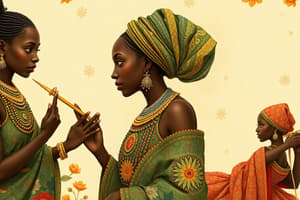Podcast
Questions and Answers
The Oba (king) is an absolute ruler with divine ______ authority.
The Oba (king) is an absolute ruler with divine ______ authority.
authority
Kingship rotates among several ______ houses.
Kingship rotates among several ______ houses.
royal
Ile-Ife became the spiritual ______ of the Yoruba.
Ile-Ife became the spiritual ______ of the Yoruba.
motherland
The ______ checked the Oba's powers.
The ______ checked the Oba's powers.
The ______ administered the quarters, villages, the towns and other domains on his behalf.
The ______ administered the quarters, villages, the towns and other domains on his behalf.
The ______ of women are assured as their leader is an official member of the council of chiefs.
The ______ of women are assured as their leader is an official member of the council of chiefs.
Yoruba settlement had the ______'s palace in the centre.
Yoruba settlement had the ______'s palace in the centre.
Marriage among the Yoruba was not a mere event between two ______ but an event involving two previously unrelated families.
Marriage among the Yoruba was not a mere event between two ______ but an event involving two previously unrelated families.
Apart from ______, the Yoruba were also traders and craftsmen.
Apart from ______, the Yoruba were also traders and craftsmen.
The Yoruba operate ______ societies.
The Yoruba operate ______ societies.
The ______ form of labour mobilisation was reciprocal in that farmer who was assisted to weed his farm or build his house today would be called upon tomorrow to render similar service.
The ______ form of labour mobilisation was reciprocal in that farmer who was assisted to weed his farm or build his house today would be called upon tomorrow to render similar service.
The Igbo have a unique ______.
The Igbo have a unique ______.
Generally speaking, even strangers did have access to land for ______ purposes through Isakole(i.e., land rent) charge.
Generally speaking, even strangers did have access to land for ______ purposes through Isakole(i.e., land rent) charge.
Polygamy is a common ______ among the Yoruba.
Polygamy is a common ______ among the Yoruba.
Flashcards are hidden until you start studying
Study Notes
Ile-Ife and Yoruba Culture
- Ile-Ife developed a centralized state system, complex artistic and craftsmanship abilities, socio-cultural and religious practices, and economic versatility.
- It became a cultural and political model for other Yoruba communities, which replicated the Ife model in their territories.
- Ile-Ife is considered the spiritual motherland of the Yoruba.
Yoruba Political System
- The Yoruba political system is complex, with an absolute ruler (Oba) who has divine authority, but their powers are checked by various institutions.
- The council of chiefs (Oyomesi or Ilu), Ogboni society, Ifa divination, and sometimes mass rebellion or rejection of the Oba's authority can limit their powers.
- The Oba's authority is not absolute, and they can be deposed by the council of chiefs.
- Kingship rotates among several royal houses, and the son of a reigning king cannot succeed his father.
Social Life
- Yoruba settlement had the Oba's palace in the center, with village heads (Baale) subject to the king through his chiefs.
- Lineage heads (Baale and Mogaji) administer the quarters and wards, but are subject to the immediate higher head.
- Youths and quarter children have their roles and rights, and the rights of women are assured through their leader (Iyalode), an official member of the council of chiefs.
- Marriage is not a mere event between two individuals but involves two previously unrelated families.
- Polygamy is a common feature among the Yoruba, and they operate patrilineal societies.
Economic Life
- Apart from farming, the Yoruba were also traders and craftsmen.
- Cooperative efforts used in farming include 'aaro' and 'owe', which involve reciprocal labor mobilization.
- Drumming and feasting would normally follow after the execution of an 'owe' or 'aaro' task.
- Strangers have access to land for farming purposes through Isakole (land rent) charge.
Igbo Culture
- The Igbo have a unique culture with three versions of their origin.
Studying That Suits You
Use AI to generate personalized quizzes and flashcards to suit your learning preferences.




